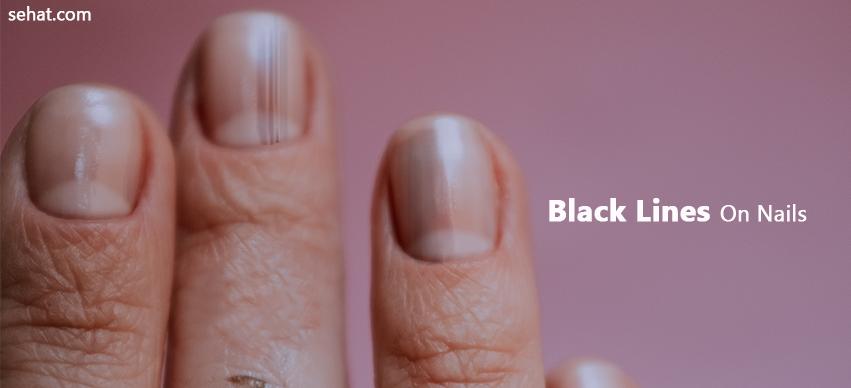A black line on the fingernail is usually a sign of iron deficiency. This can be due to a diet that is lacking in iron, or it can be due to problems with the absorption of iron from the intestines. Vitamin deficiencies can also cause this problem.
If you have a black line on your fingernail, it could be a sign of iron deficiency. Iron is an important mineral that helps our bodies make hemoglobin, which carries oxygen in the blood. A lack of iron can lead to anemia, which can cause fatigue, weakness and other symptoms.
If you think you might be iron deficient, see your doctor for a blood test to confirm.

Credit: www.sehat.com
What Vitamin Deficiency Causes Black Lines in Nails?
A deficiency in vitamin B12 can cause black lines in nails. This is because vitamin B12 helps to produce new cells, including those that make up the nail bed. Without enough vitamin B12, the body cannot produce enough new cells, leading to a build-up of old cells and a darkening of the nails.
What Does B12 Deficiency Do to Your Nails?
B12 is an important nutrient for healthy nails. A B12 deficiency can cause your nails to become thin, brittle, and curved. You may also notice that your nail beds are red and inflamed.
A B12 deficiency can also cause megaloblastic anemia, which is a condition where your red blood cells are larger than normal.
What are Nail Signs of Vitamin Deficiency?
Vitamin deficiencies can lead to a variety of health problems, including vision problems, bone and joint pain, anemia, and fatigue. One way to tell if you are deficient in certain vitamins is by looking at your nails. Here are some common nail signs of vitamin deficiency:
-Brittle nails: This can be a sign of iron or vitamin A deficiency. If your diet is lacking in these nutrients, your body will have trouble producing new cells, including nail cells. This can cause your nails to become dry and brittle.
-Spoon-shaped nails: Also called koilonychia, this condition is often caused by iron deficiency. When there isn’t enough iron in the blood, hemoglobin levels drop and red blood cells don’t function as well. This can lead to spoon-shaped nails that are thin and pale.
-Pitted nails: Nails with tiny dents or pits on the surface may be a sign of zinc deficiency. Zinc helps the body create new proteins, including those needed for healthy skin and nails. Without enough zinc, the body can’t create healthy cell membranes, which leads to pits forming on the nail surface.
Does Vitamin D Deficiency Affect Nails?
Vitamin D is essential for strong and healthy nails. A deficiency in vitamin D can lead to dry, brittle, and thin nails. It can also cause your nails to develop white spots or lines.
If you think you may be deficient in vitamin D, talk to your doctor about getting a blood test.
What causes vertical black lines on fingernails? – Dr. Aruna Prasad
Dark Vertical Lines on Nails Vitamin Deficiency
If you have ever noticed dark vertical lines on your nails, you may be deficient in a vitamin. While this is not always the case, it is worth looking into, especially if you are deficient in other vitamins as well. The most common vitamin deficiencies that can cause these lines are Vitamins B and C.
Vitamin B12 helps with the formation of red blood cells and the maintenance of nerve tissue. A deficiency in Vitamin B12 can lead to anemia, which can cause fatigue and weakness. If you are noticing dark vertical lines on your nails, along with these other symptoms, it is important to see a doctor to get your levels checked.
Vitamin C is important for the production of collagen, which helps to keep our skin healthy and strong. A deficiency in Vitamin C can lead to dryness and wrinkles in the skin, as well as easy bruising. If you notice dark vertical lines on your nails along with any of these other symptoms, it is a good idea to get your Vitamin C levels checked by a doctor.
Faint Black Line on Nail for Years
For years, I’ve had a faint black line on my nail. It’s not painful or anything, but it is definitely noticeable. I’m not sure what caused it, but I’ve been told that it’s probably nothing to worry about.
However, if the line becomes darker or more pronounced, then I should see a doctor to have it checked out.
Melanoma Faint Black Line on Nail
If you have a black line on your nail that appears to be getting longer, you may have melanoma. Melanoma is a type of skin cancer that can occur anywhere on the body, including the nails. While it is not the most common type of skin cancer, it is the most deadly.
If caught early, melanoma can be treated successfully. That’s why it’s important to see a dermatologist if you notice any changes in your nails or skin.
Black Line on Nail Cancer
A black line on your nail can be a sign of cancer, specifically melanoma. This type of cancer begins in the cells that produce melanin, which is the pigment that gives your skin its color. While melanoma can occur anywhere on your body, it is most likely to develop on areas that have been exposed to the sun, such as your nails.
A black line on your nail may also be caused by other conditions, such as a benign growth or an injury. If you notice a black line on your nail that doesn’t go away after a few weeks, make an appointment with your doctor to have it checked out.
Thin Black Line on Nail
If you have ever noticed a thin black line on your nail, you may be wondering what it is. This is called a melanonychia striata and is caused by an increase in melanin in the nail bed. Melanin is what gives our skin and hair its color, so when there is more of it present, the area will appear darker.
There are two types of melanonychia striata- longitudinal and transverse. Longitudinal melanonychia striata runs parallel to the length of the nail and is seen most often in African Americans. Transverse melanonychia striata appears as a band across the width of the nail and can be seen in people of all races.
There are several possible causes for an increase in melanin production including sun exposure, certain medications, injuries to the nail bed, and underlying medical conditions such as Addison’s disease or diabetes. If you notice a black line on your nail that was not there before, it is important to make an appointment with your doctor to rule out any serious causes. In most cases, however, this condition is benign and no treatment is necessary other than avoiding injury to the affected nails.
Vertical Black Line on Nail
If you have a vertical black line on your nail, it could be caused by a number of things. First, it could be the result of an injury to the nail. When the nail is traumatized, blood can collect under the nail and cause a brown or black discoloration.
This is called a subungual hematoma and usually grows out with the nail over time.
Second, a vertical black line on the nail could also be caused by melanoma, which is a type of skin cancer. Melanoma can occur in any area of the body that has pigment-producing cells, including the nails.
While melanomas can occur anywhere on the body, they are most commonly found on areas that get sun exposure, such as the face, arms, and legs. If you have a vertical black line on your nail that is growing quickly or changing in appearance, it’s important to see a doctor right away for evaluation.
Third, another possible cause of a vertical black line on your nail is acral lentiginous melanoma (ALM).
Dark Fingernails Vitamin Deficiency
If your fingernails are looking a little bit darker than usual, it could be a sign of vitamin deficiency. While there are many different vitamins that contribute to healthy nails, some of the most important ones include vitamins A, C, and D. If you’re not getting enough of these essential nutrients, it can lead to problems like dryness, brittleness, and even darkening of the nails.
Vitamin A is important for maintaining the health of your skin and nails.
It helps to keep them moisturized and prevents dryness and flaking. Vitamin C is also essential for collagen production, which helps to keep your nails strong and prevent breakage. Vitamin D is necessary for calcium absorption, which is important for keeping your nails healthy and strong.
If you think you might be deficient in any of these vitamins, speak to your doctor about supplements or dietary changes that can help improve your nail health. In the meantime, take care of your nails by using a good quality hand cream or cuticle oil to keep them hydrated and looking their best!
Conclusion
Iron is an essential mineral that plays a vital role in our health. It’s necessary for the proper function of hemoglobin, which is responsible for carrying oxygen in our blood. Iron deficiency can cause a number of problems, including fatigue, weakness, and difficulty concentrating.
One way to tell if you’re iron deficient is by looking at your fingernails. If you have a black line running down the center of your nail, it could be a sign of low iron levels. If you’re concerned about your iron levels, talk to your doctor about getting a blood test.

